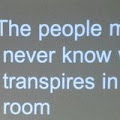Join us and James Ball, Professor Chris French, Professor Karen Douglas, Brent Lee and Jonn Elledge for a deep dive into conspiracy theory and culture. The history, the people and the dangers of a conspiracy mindset
Saturday 22 June 2024
Doors, coffee from 11.30 am
Talks & Q&A:12 pm - 6 pm (inc. breaks)
£18 / £14 cons Advance tickets
Conway Hall, 25 Red Lion Square, London WC1R 4RL
Tube: Holborn
 |
| Photo by Olof Nyman from Pexels |
Conspiracy Theory states that nothing is how it is reported, that everything you know is wrong, and that sinister forces are controlling everything for their own, dark motivations. Opposing this dark pantomime are the lone hero truth-tellers, from David Icke to Donald Trump, Alex Jones to the gnomic, anonymous Q.
Conspiracy thought has moved to the centre of society, bringing with it violence and terror and the removal of faith in conventional media and law. The concept of truth has been eroded. Conway Hall and the London Fortean Society present a deep dive into conspiracy theory, what it is, what it means, why it is believed, and what harm is caused by it? And how do we move on from this seductive, and destructive, mindset?
Jonn Elledge: Conspiracy: A History of Bollocks Theories
Jonn Elledge takes us on a fascinating, insightful, and often hilarious journey through old and new conspiracy theories to answer a vital question: how can we learn to log off the QAnon message boards, and start trusting hard evidence again? It’s always been human nature to believe we're being lied to by the powers that be (and sometimes, to be fair, we absolutely are).
But while it can be fun to indulge in a bit of Deep State banter on the group chat, recent times have shown us that some of these theories have taken on a life of their own - and in our dogged quest for the truth, it appears we might actually be doing it some damage.
Jonn Elledge is a New Statesman columnist, and a contributor to the Big Issue, the Guardian, and the Evening Standard. He was previously an assistant editor at the New Statesman, where he created and ran its urbanism-focused CityMetric site, He has written three books including ‘Conspiracy: A History of Boll*cks Theories, and How Not to Fall for Them’ with Tom Phillips.
Chris French: The Psychology Of Conspiracy Theories
is almost inevitable that any significant event will become the subject of conspiracy theorising and considerable numbers of people endorse such theories. No one denies that real conspiracies do actually occur from time to time but equally it is undeniable that unfounded conspiracies can have serious and damaging consequences for society. Why are conspiracy theories so popular? Why are some people more susceptible to conspiratorial thinking than others? Such questions have in recent years become the focus of intense research by psychologists and other social scientists.
Chris French is Emeritus Professor and Head of the Anomalistic Psychology Research Unit in the Psychology Department at Goldsmiths, University of London. He is a Fellow of the British Psychological Society and of the Committee for Skeptical Inquiry and a Patron of Humanists UK. He is the coauthor of ‘Anomalistic Psychology: Exploring Paranormal Belief and Experience’. His new book ‘The Science of Weird Shit: Why Our Minds Conjure the Paranormal’ is out 19 March 2024.
James Ball: The Other Pandemic: How QAnon Contaminated the World
QAnon began as an internet community dedicated to supporting President Trump and intent on outing a global cabal of human traffickers. A short, cryptic message posted by an anonymous user to a niche internet forum in 2017 was the spark that ignited a global movement. What started as a macabre game of virtual make-believe quickly spiralled into the spread of virulently hateful, dangerous messaging – which turned into tragic, violent actions.
From a standoff at the Hoover Dam, to the storming of the U.S. Capitol on 6 January 2021, to protesting COVID-19 lockdowns, this digital pandemic has spread globally and shows no signs of stopping. In his book ‘The Other Pandemic’ Ball takes us into the niche pathways through which these digital pathogens spread, mutate and infect people all across the globe.
Pulitzer Prize winner James Ball decodes the cryptic language of the online right and with a surgeon's precision tracks the spread of QAnon, the world's first digital pandemic. James is the Global Editor at The Bureau of Investigative Journalism. Previously special projects editor at The Guardian and special projects editor at BuzzFeed UK, James played a key role in the Pulitzer Prize-winning coverage of the NSA leaks by Edward Snowden, as well as the offshore leaks, HSBC Files, Reading the Riots and Keep it in the Ground projects.
At WikiLeaks he was closely involved in Cablegate - the publication of 250,000 classified US embassy cables in 2010 - as well as working on two documentaries based on the Iraq War Logs.
Brent Lee : Recovering from Conspiracy Theory
In 2003, Brent Lee was a musician with a strong anti-war stance and a healthy scepticism about politicians. He watched videos claiming 9/11 was a US government false flag and fell into a rabbit hole of conspiracy theory. He became convinced that secret societies ran politics, the banks, religious institutions and the entertainment industry and that most terrorist attacks were government-organised ritual sacrifices. He saw satanic symbols during London’s London 2012 Olympics opening ceremony.
Brent’s belief in a world under tight control began to weaken after the Sandy Hook shootings and crumbled after the shocks of the EU Referendum and Donald Trump becoming president in 2016. He now speaks out against conspiracy theory and hosts the ‘Some Dare Call It Conspiracy’ podcast with Neil Sanders.
Karen Douglas: Are Conspiracy Theories Harmless?
In recent years, there has been an increasing interest in the consequences of conspiracy theories and the COVID–19 pandemic raised this interest to another level. Professor Karen Douglas will outline what we know about the consequences of conspiracy theories for individuals, groups, and society, arguing that they are certainly not harmless. In particular, research suggests that conspiracy theories are associated with political apathy, support for non-normative political action, climate denial, vaccine refusal, prejudice, crime, violence, disengagement in the workplace, and reluctance to adhere to COVID–19 recommendations.
Karen Douglas is a Professor of Social Psychology. She is currently the director of the ERC-funded project "CONSPIRACY_FX - Consequences of conspiracy theories". Karen studies the psychology of conspiracy theories. Her research examines why conspiracy theories appeal to so many people, and the consequences of conspiracy theories for individuals, groups, and society.
Saturday 22 June 2024
Doors, coffee from 11.30 am
Talks & Q&A:12 pm - 6 pm (inc. breaks)
£18 / £14 cons Advance tickets
Conway Hall, 25 Red Lion Square, London WC1R 4RL
Tube: Holborn






Comments
Post a Comment